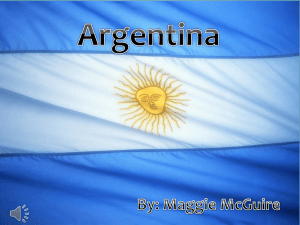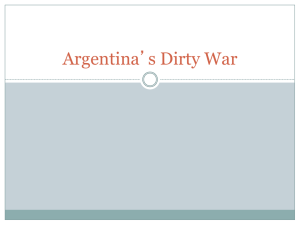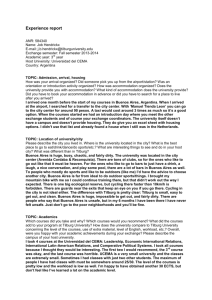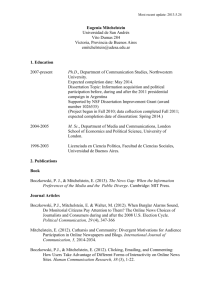EXPERIENCE REPORT ANR: 352997 Name: Lily Theelen
advertisement
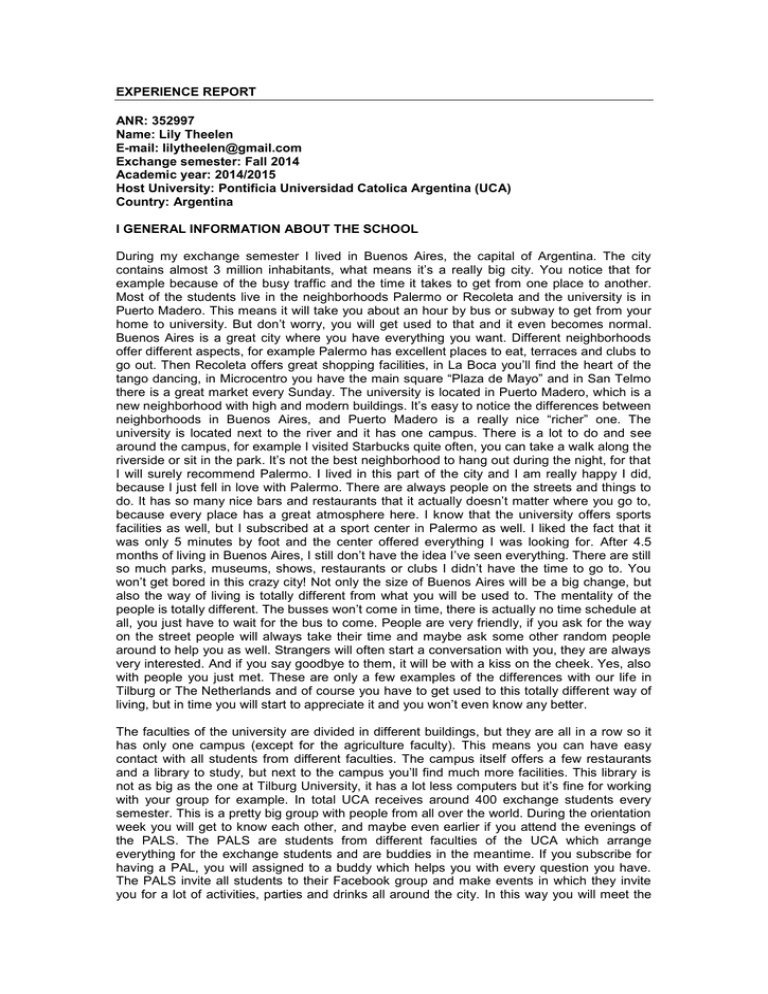
EXPERIENCE REPORT ANR: 352997 Name: Lily Theelen E-mail: lilytheelen@gmail.com Exchange semester: Fall 2014 Academic year: 2014/2015 Host University: Pontificia Universidad Catolica Argentina (UCA) Country: Argentina I GENERAL INFORMATION ABOUT THE SCHOOL During my exchange semester I lived in Buenos Aires, the capital of Argentina. The city contains almost 3 million inhabitants, what means it’s a really big city. You notice that for example because of the busy traffic and the time it takes to get from one place to another. Most of the students live in the neighborhoods Palermo or Recoleta and the university is in Puerto Madero. This means it will take you about an hour by bus or subway to get from your home to university. But don’t worry, you will get used to that and it even becomes normal. Buenos Aires is a great city where you have everything you want. Different neighborhoods offer different aspects, for example Palermo has excellent places to eat, terraces and clubs to go out. Then Recoleta offers great shopping facilities, in La Boca you’ll find the heart of the tango dancing, in Microcentro you have the main square “Plaza de Mayo” and in San Telmo there is a great market every Sunday. The university is located in Puerto Madero, which is a new neighborhood with high and modern buildings. It’s easy to notice the differences between neighborhoods in Buenos Aires, and Puerto Madero is a really nice “richer” one. The university is located next to the river and it has one campus. There is a lot to do and see around the campus, for example I visited Starbucks quite often, you can take a walk along the riverside or sit in the park. It’s not the best neighborhood to hang out during the night, for that I will surely recommend Palermo. I lived in this part of the city and I am really happy I did, because I just fell in love with Palermo. There are always people on the streets and things to do. It has so many nice bars and restaurants that it actually doesn’t matter where you go to, because every place has a great atmosphere here. I know that the university offers sports facilities as well, but I subscribed at a sport center in Palermo as well. I liked the fact that it was only 5 minutes by foot and the center offered everything I was looking for. After 4.5 months of living in Buenos Aires, I still don’t have the idea I’ve seen everything. There are still so much parks, museums, shows, restaurants or clubs I didn’t have the time to go to. You won’t get bored in this crazy city! Not only the size of Buenos Aires will be a big change, but also the way of living is totally different from what you will be used to. The mentality of the people is totally different. The busses won’t come in time, there is actually no time schedule at all, you just have to wait for the bus to come. People are very friendly, if you ask for the way on the street people will always take their time and maybe ask some other random people around to help you as well. Strangers will often start a conversation with you, they are always very interested. And if you say goodbye to them, it will be with a kiss on the cheek. Yes, also with people you just met. These are only a few examples of the differences with our life in Tilburg or The Netherlands and of course you have to get used to this totally different way of living, but in time you will start to appreciate it and you won’t even know any better. The faculties of the university are divided in different buildings, but they are all in a row so it has only one campus (except for the agriculture faculty). This means you can have easy contact with all students from different faculties. The campus itself offers a few restaurants and a library to study, but next to the campus you’ll find much more facilities. This library is not as big as the one at Tilburg University, it has a lot less computers but it’s fine for working with your group for example. In total UCA receives around 400 exchange students every semester. This is a pretty big group with people from all over the world. During the orientation week you will get to know each other, and maybe even earlier if you attend the evenings of the PALS. The PALS are students from different faculties of the UCA which arrange everything for the exchange students and are buddies in the meantime. If you subscribe for having a PAL, you will assigned to a buddy which helps you with every question you have. The PALS invite all students to their Facebook group and make events in which they invite you for a lot of activities, parties and drinks all around the city. In this way you will meet the exchange students very fast and you won’t feel alone, especially in the beginning this can be crucial. Of course there has to be studied as well. In the orientation week you will also have to choose your courses and you can subscribe for sports teams the UCA offers. The next week the courses already begin for most of the faculties. II PRACTICAL INFORMATION Information before you left At the end of December you will hear from Tilburg University which destination you will go to for an exchange semester. In March we received an e-mail with application instructions for the UCA and the deadline for that was half May. I didn’t make the deadline, because I still needed my Spanish certificate and a recommendation letter. I e-mailed the UCA that I couldn’t make it and sent them the documents I already had (also by e-mail), and fortunately everything was okay and they said I could send the documents later. After I finished my Spanish course in June I sent the missing documents so they could process my application. This means I was quite late, but I was in contact with the UCA and they said it wasn’t a problem. They also had some delay in processing all the applications. Somewhere around the start of July I received information from the UCA about the orientation week and information about housing. The orientation week would start at the 28th of July and I would arrive in Buenos Aires at the 23th, so I had some time to adapt before starting university. I could say that I didn’t experience any difficulties with UCA before I left, everything was clear and I really appreciated they gave me time to finish my application. Visa procedure and arrival A big advantage of going to UCA is that you don’t have to arrange your VISA in The Netherlands. I know from others that this can take a long time and if you’re unlucky you have to go back to The Hague a couple of times. We didn’t have to arrange anything before leaving, the UCA would start the process of getting a VISA when we were there. Indeed, in the orientation week we already received information about the steps we had to take. The process consisted of 3 steps. The first step was at the end of August, we had to go to a place in the city to sign some forms and pay a first amount of money. This was something around 3 Euro. The second step was a month later, we had to go to the Migraciones with some more forms and we had to pay another 30 Euro. One month later we would receive our VISA. A disadvantage of arranging your VISA in Argentina is that at the day of your appointment you have to wait a few hours, because there are always so many people which are also waiting for the same thing. Like in a lot of situations in this country, you have to be patient. Also, I actually never received my official VISA. They had a big delay in processing the applications of the VISAs, because they changed systems. We received a replacement form, which we could use for a month. But that wasn’t useful, because when it became invalid I still needed a VISA for my trip afterwards and so I needed to go to Migraciones another time to ask if they could extend my old replacement VISA. All in all, it was nice that we didn’t need to arrange a VISA before leaving, but it cost me a lot of time to arrange it in Argentina as well and eventually I never even received an official VISA document and we did pay for it. When I arrived in Argentina there was unfortunately no one to pick me up. I arranged a shuttle service (cheaper) from the airport which brought me to my hostel in Microcentro (Millhouse hostel, highly recommended). This wasn’t a problem at all for me, I already knew it would go like that and I booked my hostel in advance. It takes approximately 1 hour to go by taxi from the international airport to the city center. 5 days after my arrival the orientation week started. This week was well organized. Everything was situated at the university itself, this means we didn’t make any trips and so there were no costs involved in this week. We received a lot of information about the university itself, the city, living in Buenos Aires, international office, the PALS, the courses and a lot more. You could attend the international office for any questions you have. There was also often one PAL present at the international office. We all felt welcome at our new university. Orientation/Introduction activities As mentioned before there was an orientation week which took 4 days (Monday till Thursday) and every day they arranged breakfast and lunch. It was a very nice week, because next to the all the information we received, you also get to know the other exchange students. We did a few games together in which we had to work together, so that made it easier to get to know each other. Already before arriving in Argentina we could subscribe ourselves for a buddy/PAL, which of course I did. I would highly recommend this. Most of the exchange students are connected to a PAL. It’s nice to already have someone when you arrive to meet with or ask all your questions to and they also involve you in the activities they organize for all the exchange students. Housing The UCA already gave us a hand-out with a small overview of some houses and apartments that were available before I even arrived. They also put lists in the orientation week where you could subscribe if you were looking for other people to live with, so you could meet and start searching together. I was told by two friends that already went to Buenos Aires to wait with looking for housing until I would arrive. In this manner you know the city better, you know where you want to live and you can look for people who are also looking for a house and search together. There is no possibility of living at the campus, but there are enough great options in the city. I waited till I met some exchange students who were also looking for housing and fortunately I met two nice girls at the second evening of my stay in Buenos Aires at a night for exchange students. I started looking for apartments (most common) in the neighborhood Palermo (because I already heard this was the best neighborhood to live for students). The PALS provided us as well with a list of housing on their Facebook page. I immediately found some options and e-mailed if they were still available. Two days later we chose with the three of us one apartment out of two final options. It was a great apartment at a top location at Palermo Soho. The name of the landlord and his office as well is Maxim Rentals. Apart from the great experience with the apartment during the semester, at the end he ripped us of by keeping the deposit. This was not our arrangement and we couldn’t do anything about it anymore, so I wouldn’t recommend this company. One more advice is to try to pay in pesos instead of dollars or euros, because you will save money most of the time. Living Costs I received a grant of 750 Euro from Tilburg University to support my semester abroad, but except for that money it’s smart to save a lot of money before you go. I borrowed up to the maximum in terms of study grants, and I also received a fee from the public transport in The Netherlands which was 100 Euro per month. Next to that I had a savings account which I had to use. My income per month was a little bit less than at home, because I wasn’t working in Argentina and I did at home. Also because I made a lot of trips and I even went for travelling after my semester at the UCA, my expenses were more than in Tilburg. The weekend trips and the travelling were of course the most expensive expenses, but I wanted to get everything out of this opportunity of going to Argentina and so I wanted to do and see as much as I could. If you choose not do travel a lot, and just stay in Buenos Aires, I think you could compare your expenses with the ones in Tilburg. Food can be really cheap, it’s often even cheaper to go out for dinner than to cook yourself. Public transport is also cheap, and so is for example alcohol, cigarettes and housing isn’t more expensive than Tilburg as well. An important fact is that there is a ‘blue rate’ for the dollar and euro in Argentina. I advise to take a lot of cash with you when you are planning to go to this country. This blue rate is used to change your cash dollars/euros to Argentinian pesos. Instead of getting money from the cash machine (where the rate during my semester was 10.5 pesos for 1 euro), you go to a ‘casa de cambio’ (house of change) where you change your euros in cash to pesos. Here you get a higher rate (when I was there it was around 15 pesos for 1 euro). This rate differed a lot, it got higher during my stay and at one point it decreased again. In any case, there is a huge difference between the official rate and this ‘blue rate’. A famous place to change is the street called Florida, where there are a lot of people screaming ‘cambio’ or ‘change money’. In the beginning I didn’t know about this blue rate, but when I discovered it and used it by asking people who visited me to bring me euros, I had a big advantage. In Argentina of course you can’t get dollars easily, but in Uruguay you can. So a lot of people travel to Uruguay to get their dollars. This could also be an option for you, but please don’t forget to bring euros from The Netherlands as well. My approximate monthly budget during my exchange was: - Housing: 300 Euro - Food: 300 Euro Transport: 30 Euro (public transport but also the use of taxis) Books: I didn’t have to buy books, I only had to pay for the costs of copying my Spanish course book which was around 10 Euro I guess - Miscellaneous: Differed each month, depending on for example how many trips I made or how many times I went out. But my income per month was 1000 Euro, and there wasn’t any month in which I made the month with this amount of money. Every month I had to take money from my savings account. But again, I did a lot and it depends on how much you travel or do next to studying. All my expenses all together, for 6 months of studying abroad and travelling, where approximately 6x1000 Euro (study grants) + 4000 Euro (savings account) = 10.000 Euro. Academic Calendar I arrived the 23th of July and I started my orientation week the 28th of July. The first day of the semester was one week later, the 4th of August. But this week only the obligatory Spanish course started, the rest of my courses started another week later. The mid-terms are at the end of September and beginning of October. Than my exams I had at the end of November already, so I was done at the beginning of December. This gave me enough time to travel before going back home. I have to tell that I followed PEL-courses, which are courses of a special program for exchange students. They take into account that we were exchange students and we want to travel, that’s why the exams are earlier than the rest of the faculties. For other faculties the exams could take up to half December. Also, the Argentinians have a lot of long weekends. I think we had around 3 or 4, which gives you great opportunities to travel for a long weekend. I know that in the spring semester there are even more. The International Office There is an international office at the campus in case you have any questions. I went there mostly in cases of my VISA or to register for events. In all these cases it was really helpful to have this office and they helped you well. For important things they always e-mailed us. Furthermore the office had certain opening hours, but that was fine. Exchange promotion During my exchange at UCA and by meeting so many people from Argentina and other countries, we of course discussed our own universities as well. I noticed some differences between Tilburg University and UCA, mostly in the advantage of Tilburg University. Of course I expressed these things to other students. I also took part at the exchange market of the UCA, where we had a small stand of Tilburg University and we answered questions about our university at home. There were a few people interested in maybe going to our university, and additionally we gave our number to them in case they had more questions. I think taking part in this market was a good way of promoting Tilburg University. Social Activities The team of PALS organized a lot of parties, trips and other activities for international students. They take you to places even local people are going and take you to really nice and worthy places to visit in the country. Unfortunately, they don’t have student organizations, but everyone joined the activities of the PALS and felt connected to each other by this. These PALS really made my exchange. I also had contact with local students. Argentinians are very open and will always try to have a conversation with you. At university or at parties you will get easily in contact with local people. This is a good thing, because they will learn you even more about the culture, language and their lifestyle. I also travelled a lot during my exchange. I went to Puerto Madryn (which is already in Patagonia) to see whales and sea elephants during a long weekend in August. Then I went to the Iguazu Falls in September with the PALS, and I also went to a city called Rosario with two friends in September. In October I made a road trip in the north-west of Argentina, around Salta. We rented a car for a week and saw some outstanding landscapes. In November I only went out during the weekends, because it was such a beautiful summer weather in Buenos Aires and we wanted to enjoy our last month in Buenos Aires together. Than in December I started backpacking. First I went to the south of Argentina called Patagonia, then I visited the Lake District, the vineyards in Mendoza and saw some places in Chile such as Valparaiso. After that I returned to Buenos Aires for some days and took the plane to the north of the country with two Dutch friends who came to travel with me. From there we travelled for 2.5 weeks through Bolivia and Peru, which was amazing. I did everything I wanted the most, but still there is so much more to see in South America. That means I have to go back one day, but I’m not bothered by that idea. Culture and Language I surely experienced a culture shock during my semester abroad. In fact, it started from the moment I arrived. I immediately noticed that everyone spoke Spanish and everything was in Spanish, and my level of Spanish was way too low. This immediately caused problems, because especially in the beginning you have to arrange a lot of stuff and you meet a lot of people. The fact that everything was in a language I couldn’t speak good enough, made everything so much more difficult. Also the contact with exchange students was in Spanish, so I highly recommend you to make sure you can speak in at least basic Spanish from the beginning. This will make everything a lot easier. At UCA you have to follow a Spanish course when you have a level less than C3 or something like that. I just possessed the level I needed to go on an exchange, but I noticed speaking is a different part of a language and surely the most difficult one. For me the language course at UCA was very helpful, but it is also important to just try and speak it because then you’ll improve the fastest. I also immediately noticed that the lifestyle of the people in Buenos Aires is so different than what we are used to, for example the way they interact with each other. The people are very open and direct. Family comes first in this country and they always make time for friends. As said before, the people in Argentina greet each other with a kiss on the cheek and also with saying goodbye they do this, also with people you just met. The size of the city, the huge amount of traffic, the protests on the street every day, the public transport without schedules, the different eating habits, the infrastructure, no possibility of riding your bike, are just examples of differences between the culture of Argentina and the Netherlands. In the beginning it was quite difficult for me to adapt and especially the language I couldn’t speak made it really difficult. You start to realize that we (Dutch people) live in a country that is really well-organized. It seems that we took care of everything in The Netherlands, for example the insurances we all have or the great infrastructure. It’s not so logic for the Argentinians to have all that we have in the Netherland, they can only dream about living in such a developed country. I expected that Argentina would have been much more developed, and relatively Buenos Aires is, but you can’t say that about Argentina. I also expected that I could manage it in the beginning with speaking English and I definitely thought the exchange students would communicate in English, but that wasn’t the case. Everything was in Spanish. It took me 2 months before I could have a decent conversation and after that it became only easier by time. Also, slowly you’re adapting to the culture and lifestyle and eventually you will make it yours. At the end, I appreciated the lifestyle of the Argentinians so much and by finally speaking the language I really achieved something for myself and I enjoyed my time there to the fullest. The Argentinians have a great way of how they interact with each other, everything is so personally. Also with the professors at university you have a personal band. They appreciate everything they have, also when they don’t even possess that much. In The Netherlands the people are quickly dissatisfied and stressed, I think people in Argentina don’t even know the word ‘stress’. Furthermore Argentinians know best how to prepare meat and dinner is the most important meal here. It starts late, you share everything and it takes hours, it’s their quality time with family or friends. They have a kind of rhythm and rest over them, Dutch people could take as an example. I surely had to get used to all of this, I mean I wasn’t used to this lifestyle, but except for the fact that they are not that good in organizing things and being in time, I could appreciate it. And even the negative points you take for granted over time. I learned to be more relaxed, don’t plan too much, live day by day and enjoy the people and things around me. Outside Buenos Aires you already notice the differences. Buenos Aires is a huge city where you can find almost everything you want, but the rest of the country is less developed (except for some other big cities). Argentina consist to a large extent of vast landscape. The country is so diverse, you’ll find everything here. In the south you have the glaciers, a little bit higher you have the Lake District, than higher in the west you have the vineyards, in the north-west you have a desert landscape, in the north-east you’ll find the Iguazu Falls, you can find wild animals in the east at the seaside and then they also possess some great cities and beaches. Not only the landscapes are different, also the cultures, the people, their lifestyles and their wealth differs. I’ve also been to Bolivia, which is way poorer than Argentina and Peru you can compare more to Argentina but is still less-developed. Still Argentina is also a lot lessdeveloped than Europe or the Netherlands. Personal Development I experienced such a cultural shock from the moment I arrived, but the fact that I overcome it and that I actually learned to speak the Spanish language made me feel like I really achieved something for myself. I learned to appreciate the Argentinian way of living and I made it my own. I met so many great people from countries all over the world and learned so much about different countries and cultures. I even made friends for life. Actually I don’t even have words to describe what this semester in Buenos Aires did to me, you just have to experience it yourself. It will be such a personal development, in so many ways. This whole cultural thing will only teach you things at the end and will make this semester so much more memorable. It will make you a richer person and I can only recommend to do it as well. Don’t see it as something negative, but just take your chance to experience this challenge. Not only on a personal level, but also on a professional level such an exchange will bring you further. You learn a lot about different cultures and habits. It will broaden your view about things and you will have a more open view to the world. You have to adapt to a complete different way of living in a city where you don’t know anyone and maybe you will also have to learn speaking Spanish which will be difficult. But if you managed to do that, it will give you the feeling that you can do everything you want. Such an experience is good for your personal development and immediately for your chances at career possibilities, because employers will always look for people with a lot of qualities. And you will surely extend your qualities by going on an exchange to Argentina. If I could do things differently if I had the chance, I would have surely learned to speak better Spanish before going. As said before, this would have made the beginning a lot easier. I really regretted the fact I didn’t learn to speak the language properly. But I’m proud of the fact I just went on my own and started a new life from the bottom. I learned a lot about myself, about my life there and also my life in The Netherlands. The best experience of my exchange is I guess the experience itself. The experience of leaving everything in The Netherlands behind, just go to the other side of the world with only your backpack and an address of a hostel, not knowing anyone in the city, not speaking the language, and then ending with being able to speak a new language, new knowledge, new friends and a new memory you will never ever forget. III ACADEMIC INFORMATION Academic level at a host university There are a lot of courses offered at the UCA, at different faculties. All the courses are taught in Spanish, but there is also a program for exchange students. This PEL-program contains around 20 courses, included around 3 English courses. I followed 4 courses of this program, because it was my minor so I could follow courses I wanted. The advantage of this PELprogram is that they keep in mind that we were exchange students so we don’t speak the language fluently. Also the professors talk more slowly, you can miss 4 classes during the semester which is more than the normal courses and the exams are earlier than the rest of the university. Courses of this program were based on Latin America and I thought thus very interesting and they were easier than the regular courses of the university. If you can choose courses you want, I would recommend to choose courses from this program. I followed the following courses: Cultural Identity and Stereotypes, Desarrollo Humano, Procesos Politicos y Sociales, Aprendizaje desde el Servicio and my obligatory Spanish language course. This means 1 English course, and 4 Spanish ones. I was very satisfied with my courses, they were all interesting and my schedule was pretty good. I could recommend all of these courses, but of course it depends if you think they are interesting as well. But I recommend you to follow in any case courses of the PEL-program if you have the opportunity to do so. These courses have a lot of advantages, and they are also pretty easy to pass. I could say that the academic level of my courses is much lower than my courses in The Netherlands. Most of the times we just had to read articles and participate in discussions or do presentations. My only challenge was the Spanish actually. The teaching style was more interactive and thus more personal as well. Also because you will have lessons in small classes (no more than 30 students) you will have more personal contact with the professors. This gives you a little bit the idea of a secondary school, but it is actually pretty pleasant. The way of teaching was less theoretical than what I was used to, there won’t be lectures in such a big lecture rooms as in Tilburg. We had to work a lot in groups and we were asked a lot about our ideas and countries. Although the academic level wasn’t that high, I followed maybe 5% of the first lectures due to my problem with the language. Eventually I wrote papers in Spanish and had oral exams in Spanish, and managed to pass them all, so I am very happy about that. Exams My midterms consisted out of papers or presentations, and my exams were also papers, presentations or orals. It wasn’t that difficult, at one midterm you were even able to use your notes for it. We were always allowed to take our dictionary and you could ask questions to the professor if you didn’t get something. I didn’t have something like a theoretical exam I am used to from Tilburg University. Other There is a library at UCA as well, it just doesn’t look like the one of Tilburg University at all. It has a maximum of like 50 computers in one room which you have to share with all the students of the UCA. This is doable though, because not as many students go to the library there as we do in Tilburg. There is also a department of books and papers you can borrow to read. Description of Courses Course name: Desarrollo Humano Procesos Politicos y Sociales Aprendizaje desde el servicio Cultural Identity and Stereotypes Español Prereq. None None Exam Paper Paper Major at BI PEL PEL Approved as Minor course Minor course None Presentation PEL Minor course None Presentation, PEL papers and oral Written and Language oral None Extra course Extra course Tips for the future students: I would definitely recommend you to take your chance and go on an exchange. You always hear such a great stories from people that went on an exchange, it actually doesn’t matter where you go to. But I would definitely want to promote for going to Buenos Aires. Argentina is just an amazing country, which offers you beautiful landscapes of all kinds, a great culture, an appealing language and lovely people. Buenos Aires itself offers you everything you need, a great atmosphere with incredible facilities. The UCA is a nice private university to study. There is surely a difference between UCA and other universities in town. Only richer Argentinian students have the opportunity to study at the UCA, the facilities and quality of the education are more properly. They make you feel welcome and help you a lot. The fact that UCA is there for people with relatively more money gives you a blessed feeling to also walk at this campus, although for us it’s maybe more common to attend such an university. And who doesn’t want to study at the same university Queen Maxima did? Don’t forget to take a huge amount of cash to Argentina and try to learn to speak at least basic Spanish before going. You can’t study enough or know enough to take care of yourself directly from the beginning. I would recommend not to search for housing before going, but find it all out when you are there. Then you can choose where and with who you want to live, and there is always enough available in terms of housing in Buenos Aires so you don’t have to worry about that. At last, enjoy! You’re going to have the best time of your life! A picture is worth a thousand words UCA Iguazu Falls Contact details: Lily Theelen lilytheelen@gmail.com l.j.theelen@uvt.nl Tango show Buenos Aires Dinner with friends; Argentinian style Macchu Picchu
